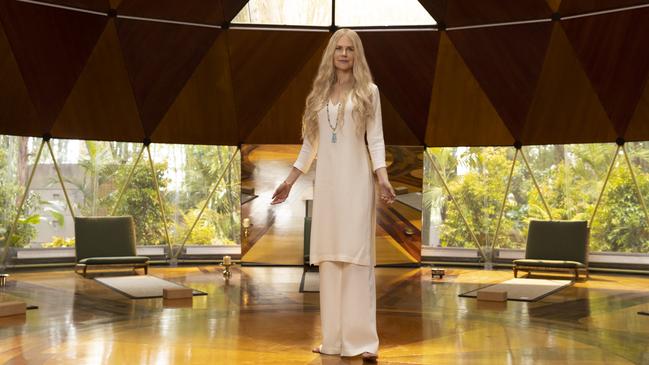Downward dog to anti-vax: Trendy yoga is starting to stretch the truth
Online wellness gurus are getting rich off ‘conspirituality’, a dangerous collision between new-age philosophy and hoax theories that has grown at an extraordinary rate in the pandemic

In a video that has been viewed thousands of times, two women who consider themselves to be “truth-seekers” are discussing the pandemic.
“There are a lot of questions about how real the coronavirus really is,” the older woman says, while the other nods enthusiastically.
The corona, she continues, is a part of the cell that the body rejects, a toxicity that is almost certainly linked to 5G waves. Besides, she says, “viruses have never been proven”.
It is predictable stuff, coming from Kerry Cassidy, an American conspiracy theorist. But the other woman in the video is more surprising. Until her sudden death this month at the age of 41, Guru Jagat, otherwise known as Katie Griggs, was a cult figure in the world of kundalini yoga.
Conspirituality, a blend of new-age philosophy and conspiracy theory, has grown at an extraordinary rate since the beginning of the pandemic. Research published in March by the Centre for Countering Digital Hate showed that 12 influencers were responsible for nearly 70 per cent of the vaccine misinformation spreading online. Most of these influencers are associated with so-called “wellness”.
Now governments are starting to take it seriously. Last week, in France, Miviludes, an agency responsible for monitoring the spread of sectarian movements — cults, in other words — warned that the yoga and wellbeing industries are now among the most fertile breeding grounds for conspiracy theories and anti-vax information.
To understand how this has happened requires that we stop thinking of yoga as a genteel pastime for the middle classes and see it as an ideology — and one that has longstanding associations with the far right.

The first sign of what was to come appeared in March last year, when a glamorous American wellness expert, Kelly Brogan, posted a video online. Before the pandemic, Brogan, who calls herself a “holistic psychiatrist”, was a star of the wellness scene, with a reputation akin to that of the mysterious guru played by Nicole Kidman in Nine Perfect Strangers.
She has advocated a less medicalised, more soulful approach to mental health, railed against Big Pharma, had a star-studded waiting list at her Madison Avenue clinic and was a contributing editor to Goop, Gwyneth Paltrow’s wellness website and shop.
Like many of the key players in this brave new world of turmeric lattes and jade eggs, she nurtured a deep suspicion of the medical establishment. New clients were asked to fill in forms agreeing to forgo dairy and gluten and asked if they believed in pharmaceutical medication and whether or not they vaccinated their children.
But the pandemic was a turning point. Now, Brogan warned, Covid-19 deaths were “likely being accelerated by the fear” of the virus. This fear was being stoked by the “mainstream media” to erode our trust in one another. “We are all going to be OK. You’re all already OK,” Brogan said, soothingly, while comparing lockdown measures to the “dehumanising agendas that preceded the Holocaust”.
The video went viral and Brogan has not stopped posting since. Both she and her husband, Sayer Ji, a guru and health shop owner, are in the “dirty dozen”, the list of influencers producing the majority of vaccine misinformation, according to the CCDH research.
It is hard to monitor how this idea has spread through the wellness community, but this isn’t just a world of West Coast and New York woo-woo.
Annie Kelly, a researcher and the co-host of the QAnon Anonymous podcast, has been studying far-right conspiracy groups for years, but was surprised by the demographic she has seen protesting against lockdown measures on the streets of London. “I was looking up the organisers and expecting to see some familiar faces, and I didn’t,” she says. Instead, they were young women, often mothers, dressed in an “Instagram aesthetic”.
Two of the ringleaders, Laura Ward and Lucy Davis, were life coaches with an interest in meditation. “Pastel Q” content — the name given by a Canadian researcher, Marc-Andre Argentino, to this cross-section of wellness and conspiracy — is hard to detect. It is often masked in obscure spiritual language, with messages shared in private Facebook groups or short-lived clips on Instagram stories, but it has spread particularly quickly. Kelly says many of the key players sold candles or vitamins through “multi-level marketing” companies, controversial schemes that hire people to sell directly for commission, which have thrived in the wellness community.
Guru Jagat, who founded the RA MA Institute in Venice Beach, Los Angeles, was the hipster face of kundalini yoga, a form that believes a divine feminine energy resides, coiled like a snake, in the base of the spine. Her students, who included the actress Kate Hudson and the singer Alicia Keys, wore turbans. She had 80,000 followers on Instagram and nearly 30,000 on her YouTube channel.
Early last year, Jagat began posting hashtags relating to QAnon, the conspiracy theory that posits that the world is under threat from a cabal of paedophiles and that Donald Trump is leading the fight for truth. She launched diatribes against the “woke agenda”. She died suddenly on August 1 from a pulmonary embolism after ankle surgery.
Matthew Remski, a researcher and cult survivor, is not surprised that the yoga community has proved such a fertile ground for conspiratorial ideas. Since the Woodstock festival in 1969 opened with a yoga chant, he says, “the predominantly liberal media has been labouring under this naive perception that yoga itself was counter-cultural in a politically progressive way”.
In fact, the opposite has tended to be true. The Nazis were fascinated with yogic concepts of bodily purification and excellence. Between the world wars, two retired British military officers, Francis Yeats-Brown and JFC Fuller, embraced fascism and yoga. While Fuller believed that yoga could teach men to be strong and powerful leaders, Yeats-Brown celebrated yoga as a part of “Aryan” racial inheritance.
Yoga is hyper-individualistic and libertarian, Remski says. “It teaches that your body is sacred because it is whole. It doesn’t need anything else. It has purity in relation to its environment; it consumes pure foods, it has excellent immunity. You do not need to worry about collective ideas like public health — in fact, they are impositions against your bodily sovereignty.”
It is hard to know whether these influencers believe the conspiratorial messages they are spreading. For some, the timing seems auspicious. At the start of the pandemic, kundalini yoga and its founder, Yogi Bhajan, were engulfed in a wave of #MeToo sexual misconduct allegations. “It allowed [Guru Jagat] to distract her own membership from the fact that there had been a whole slew of #MeToo reporting showing kundalini yoga as a whole to be a damaging cult,” Remski says.
For others there is a financial incentive. The natural health market is worth billions and is largely unregulated. Imran Ahmed, the director of the CCDH, says tech companies and their opaque algorithms bear a lot of the responsibility. Their research shows that if you are posting wellness and alternative-health content, Instagram will automatically start recommending anti-vax accounts.
“Everyone thinks the platforms give you more of what you like, but they give you more of what they want you to like,” Ahmed says.
Conspiracy is controversial and controversy keeps people engaged. The QAnon Anonymous podcast has covered the rise of a New Jersey-based yoga teacher called Krystal Tini, who had about 2000 followers on Instagram — until she started posting QAnon material. Then her following exploded to more than 100,000 in a matter of weeks.
That is the quandary for influencers such as Brogan and Ji, who have not quite come out in support of the QAnon conspiracy. “It is too toxic as a brand to endorse but too lucrative to denounce,” Remski says.
Should we be worrying about any of this if vaccination rates are high? Kelly believes we should. Leaving aside that mothers will be crucial in any effort to roll out the Covid vaccine to schoolchildren, “people underestimate the damage of a healthy, thriving movement like this. Trust in medical authority is very easily lost and very hard won”.
If these attitudes are left to bubble away online, we may see that, over time, people become less likely to vaccinate their children against any disease. Even worse, there might be another pandemic. Whatever the solution, it is going to be a global fight.
The Sunday Times







To join the conversation, please log in. Don't have an account? Register
Join the conversation, you are commenting as Logout